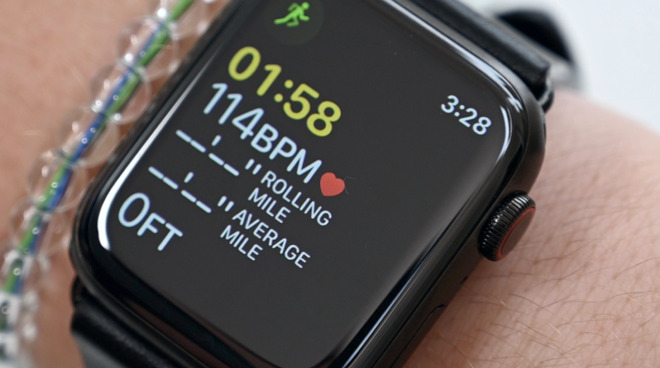Apple Watch alerts YouTuber to potential tachycardia
Joel Telling, who presents the YouTube channel "3D Printing Nerd," went to the emergency room after his Apple Watch Series 4 alerted him to an elevated heart rate.

Apple Watch monitoring heart rate during exercise. Joel Telling was not doing a workout when his Apple Watch Series 4 alerted him to an elevated heart rate
In a series of tweets, YouTuber Joel Telling has recounted how an alert on his Apple Watch Series 4 resulted in his going to the ER. The Watch's health systems displayed a high heart rate notification, indicating that his heart rate had risen abnormally during a period without apparent exercise.
"Last night was fun," he said on Twitter, explaining how he'd gone to hospital because he had a pulse over 120bpm. "This is because my Apple Watch notified me of an elevated heart rate. This little device I wear on my wrist is amazing."
This is not the first time that Apple Watch has detected such abnormal heart rates and alerted the user. In February 2019, a nurse was taken to hospital by colleagues following such an alert.
Then in March 2019, a man alerted to tachycardia, or elevated heart rate, went to hospital where he began receiving treatment.
In the new case of "3D Printing Nerd" YouTuber Joel Telling, the cause was identified after a few hours with further hospital tests.
"Thankfully," continued Telling, "tests showed no pulmonary embolism, and no irregular heart electrical activity. Most likely this is from stress and dehydration from recent travel. Very VERY thankful to hear that because after a few bags of fluids, pulse was down."
"If you take anything from this - be mindful of your health and pay attention to any warning signs," he concluded.

Apple Watch monitoring heart rate during exercise. Joel Telling was not doing a workout when his Apple Watch Series 4 alerted him to an elevated heart rate
In a series of tweets, YouTuber Joel Telling has recounted how an alert on his Apple Watch Series 4 resulted in his going to the ER. The Watch's health systems displayed a high heart rate notification, indicating that his heart rate had risen abnormally during a period without apparent exercise.
Last night was fun. This is me in the ER because of tachycardia, with a pulse over 120bpm. Heart tests are fun. pic.twitter.com/rYR8Ctfqn4
-- Joel Telling - 3D Printing Nerd (@joeltelling)
"Last night was fun," he said on Twitter, explaining how he'd gone to hospital because he had a pulse over 120bpm. "This is because my Apple Watch notified me of an elevated heart rate. This little device I wear on my wrist is amazing."
This is not the first time that Apple Watch has detected such abnormal heart rates and alerted the user. In February 2019, a nurse was taken to hospital by colleagues following such an alert.
Then in March 2019, a man alerted to tachycardia, or elevated heart rate, went to hospital where he began receiving treatment.
In the new case of "3D Printing Nerd" YouTuber Joel Telling, the cause was identified after a few hours with further hospital tests.
"Thankfully," continued Telling, "tests showed no pulmonary embolism, and no irregular heart electrical activity. Most likely this is from stress and dehydration from recent travel. Very VERY thankful to hear that because after a few bags of fluids, pulse was down."
"If you take anything from this - be mindful of your health and pay attention to any warning signs," he concluded.

Comments
If you were dehydrated then great, the hospital would have hydrated you properly. If it was a real heart attack then great you got the treatment you needed. In either case you were treated correctly because you acted on the information given to you. Apple Watch did its job.
That said the watch is not ideal for detecting fast changes in heart rate (such as those experienced when lifting weights), for those one will still need a chest strap. Conveniently the Apple watch pairs with these anyway (and it actually saves the watch's battery too.)
People whom a doctor may see as at risk for a possible cardiac event are often put on out-patient monitors and sometimes telemetry. It appears this provides continuous monitoring of the heart rate, and possibly detect arrhythmia, using chest electrodes.
That seems pretty similar to what the Watch does but on a more accurate, sophisticated scale. And the Watch couldn't do it continuously for 24hrs.
If my Watch showed my pulse to be abnormally high I might check it manually and hope it's wrong, but I'd be very doubtful. Like stated previously, it's job is to alert not diagnose. That's good enough for me. They may well be non-life threatening episodes of some nature, but I'd want to know WTF.
Seriously, if you worry about your life you head straight to the emergency room; it's better to get laughed out of the building several times, then dying once.
But… You also need to apply a bit of common sense, and learn how to interpret a warning sign.
I've gotten several warnings about elevated heart rate while at rest, but without it being a super extreme elevation, and with no other signs, I simply didn't have enough cause to run straight to the emergency room. So I just booked a regular doctor's appointment (~7 days waiting time; in Sweden). If I did stupid I'll give you all an update when I actually see the doctor tomorrow.
Totally, 100% agree. Especially the part about ER docs & such over reacting and, unless it is an emergency, stay out of the ER (seek a more sane alternative). It's a dangerous place. Particularly for potential heart issues, they will look until they find something -- then you are on their conveyor belt...